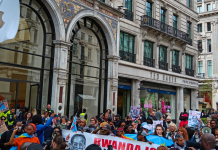rs21 is an organisation of revolutionaries, which exists to help our members to be active in political struggles. It’s crucial to our effectiveness in those struggles that we have a clear understanding of the world in which we live. Sometimes that understanding is easy to achieve, but at other times it’s necessary to address complex issues. We are therefore setting up an area on our website where we will publish longer, more in-depth pieces of writing. We welcome the submission of articles, comments, interviews and book reviews on all the major issues facing revolutionary socialists today.
We want to publish pieces that help people to develop their political ideas, and to take forward the political struggles in which they are involved. We are centrally concerned with the struggles of workers and oppressed groups. We want to publish writing which is relevant to these struggles, and accessible to those involved in them. We want workers and oppressed people to write for us about their insights into the complex political issues they face.
This means that the kind of writing we want to publish is very different from academic writing. We reject the style of writing favoured in the academy, which too often excludes workers and oppressed people by use of unnecessarily complex language, which frequently conceals confusion of ideas.
You should make your writing accessible by explaining the context of the topic you are writing about: you should not assume that the reader has background knowledge already. Use technical terms from philosophy, political economy or other fields only where necessary, and define them when you first use them. Non-English words should be translated as much as possible. We will not accept any terminology that reinforces oppression in society.
House style
Word length: Our word limit is between 4,000 and 15,000 words. You are welcome to send us longer or shorter pieces, and we will discuss with you, and assist in either lengthening them or reducing them.
Abbreviations/sets of initials: Unless you are writing about something well known, we ask that you write out in full in the first instance with the abbreviation in brackets e.g. University and Colleges Union (UCU). Don’t use dots between letters e.g. use IMF not I.M.F.
Geography: Please use a capital for a political entity e.g. “The West thinks…”, and lower cap when referring to a geographical area e.g. western Canada. Place names, and transliteration/translation can be political questions – check with us if you are unsure.
Numbers: You should spell out one to ten, and use numbers for 11 upwards unless you are getting to big numbers – so write one billion rather than 1,000,000,000.
Time: Use a colon (:) if there are minutes e.g. 7:30pm and put in am or pm.
Quotes: Use single quotes (‘) around something that is a direct quote from someone. If it is longer than three lines, please insert it as a paragraph, and use the tab key so people can see it is a quote within a bigger passage. Use double quotes (“) for quotes within quotes and single quotes if there is something that is in ‘scare quotes’.
Footnotes: You don’t have to use footnotes. If you decide to use footnotes, please set them at the bottom of the page to ease online reading. If quoting sources use basic bibliographical information and try not to clutter the footnote with lots of books and articles. You are welcome to use footnotes that clarify something in the main piece, or refer to something in parenthesis that cannot be picked up in the main piece. We also ask that if you are referencing books, articles or websites, you use a consistent approach in how you cite the author, title, date etc.
Sending your article: Please send us your article as an email attachment in Microsoft Word or via Google Docs. Please do not send them as a pdf or read-only format. You can email us at rs21editorial@gmail.com.













